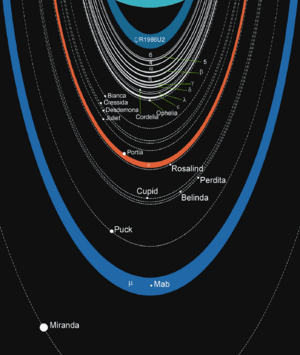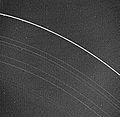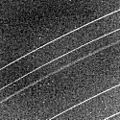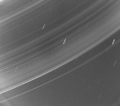Rings of Uranus facts for kids
The rings of Uranus are amazing circles of rock and dust that spin around the planet Uranus. Think of them like giant cosmic hula hoops! Uranus has 13 known rings in total. They are named using numbers and Greek letters.
These rings are quite dark and hard to see. Most of them are only a few kilometres wide. The rocks in these rings can be tiny dust particles or as big as 20 meters (about the size of a bus!).
The closest ring is about 38,000 km from Uranus's center. The furthest ring is much farther, about 98,000 km away.
Discovering the Rings
Scientists first found nine of Uranus's rings on March 10, 1977. This discovery was made by James L. Elliot, Edward W. Dunham, and Douglas J. Mink.
Later, in 1986, the Voyager 2 spacecraft helped us find two more rings. Then, between 2003 and 2005, the Hubble Space Telescope found two more outer rings. This shows how space telescopes help us learn new things!
How the Rings Formed
Scientists believe the rings of Uranus are not very old. They think the rings are less than 600 million years old. This might sound like a long time, but it's young compared to the age of the planet itself!
The most popular idea is that the ring system formed when several of Uranus's moons crashed into each other. When these moons collided, they broke into many pieces. These pieces then spread out and formed the rings we see today. It's possible that scientists might find even more rings around Uranus in the future!
Images for kids
-
Comparison of the Uranian rings in forward-scattered and back-scattered light (images obtained by Voyager 2 in 1986)
-
A long-exposure, high phase angle (172.5°) Voyager 2 image of Uranus's inner rings. In forward-scattered light, dust bands not visible in other images can be seen, as well as the recognized rings.
-
The μ and ν rings of Uranus (R/2003 U1 and U2) in Hubble Space Telescope images from 2005
-
An enhanced-color schematic of the inner rings derived from Voyager 2 images
See also
 In Spanish: Anillos de Urano para niños
In Spanish: Anillos de Urano para niños










